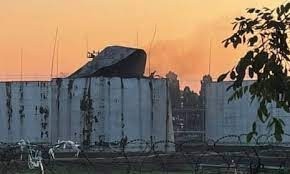
Romania, a member of NATO, is directly across the Danube from the facilities.Since Russia reneged on a pact permitting Ukraine to carry wheat, corn, and other items across the Black Sea, the Danube has become a crucial export channel for Kyiv.
The Black Sea port city of Odesa, which has experienced virtually nightly attacks, also saw the destruction of a grain store.
According to officials, almost 60,000 tonnes of grain have been lost in the last week.
The price of grain has increased by 8% on global markets on the day following Russia’s withdrawal from the grain agreement on July 17.
The deal’s failure also means that Russia has resumed its earlier suspension of its targeting of Ukrainian ports.
Oleh Kiper, the mayor of Odesa, whose territory includes the Danube ports of Reni and Izmail, claimed in his Telegram channel that Russia had used drones built in Iran to assault the infrastructure there for four hours.
He said that storage tanks and a grain hangar had been destroyed. Three warehouses, according to other local officials, were bombed.
Air defenses destroyed three of the approximately 15 drones involved in the attack, Mr. Kiper continued.
According to officials, four people were injured, one critically.
Klaus Yohannis, president of Romania, denounced the incident that occurred “very close” to his nation.
“The security in the Black Sea is at considerable risk due to this recent escalation. Additionally, it has an impact on grain transit through the UA (Ukraine), affecting global food security, he noted on Twitter.
According to Romanian media, troops and sailors on the other side of the river could see and hear dazzling lights as well as the approaching drones and explosions.
According to one journalist, it was the war’s first direct hit on Romanian land. Around 200 meters across the Danube, across from Romania, sits Reni. Galati, a port city in Romania, is 10 kilometers away.
Since the Russian invasion, the Danube as well as rail and road networks from Ukraine to Poland, Romania, and other neighboring countries, have been developed as export routes.
In the last year, two million tonnes of grain were shipped via river, up from 600,000 the year before.
However, all of these routes are significantly more expensive logistically than shipping by sea, and they have only been able to move a small portion of what Ukraine needs to export.
Farmers in neighboring nations have been incensed by the exports via eastern Europe because Ukrainian grain has crowded markets and driven down prices.
Russian President Vladimir Putin has stated that his nation is “capable of replacing the Ukrainian grain both on a commercial and free-of-charge basis” for nations in Africa that had imported from Ukraine as Russian attacks on Ukraine’s grain exports continue.
Later this week, a summit between Russia and Africa will be held in Moscow.
The seventh-largest exporter of wheat in the world, Ukraine is frequently referred to as the breadbasket of Europe. 71% of its land is used for agriculture.


Share your thoughts